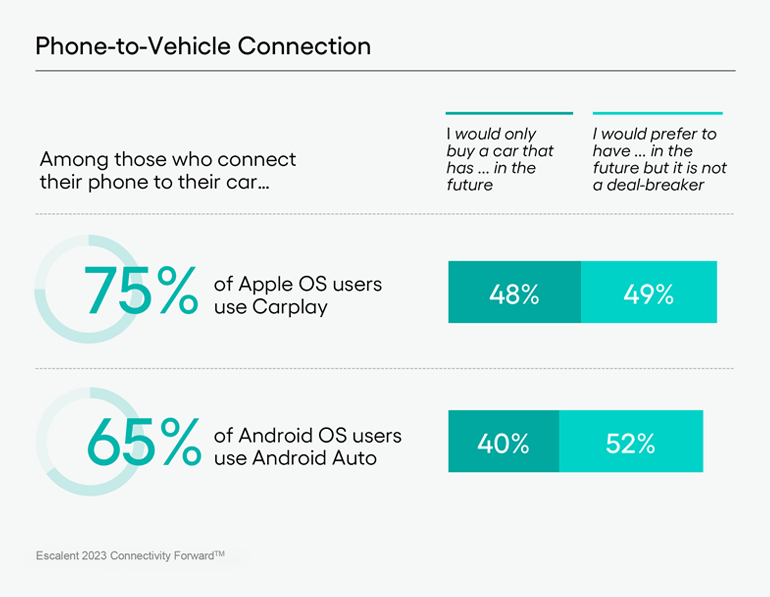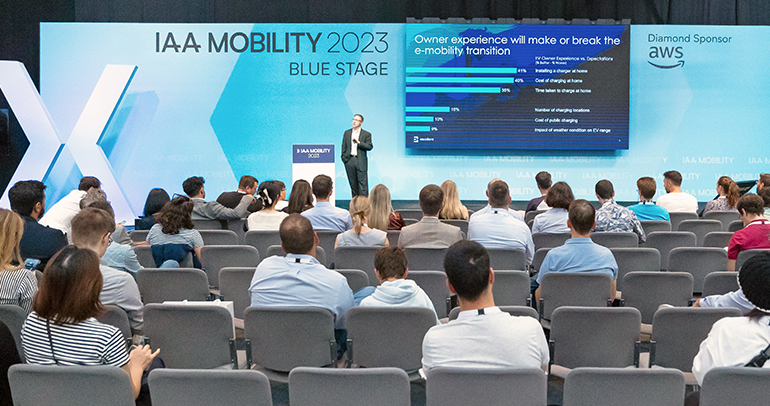
Today, 94% of drivers connect their phones to their cars, according to Escalent’s one-of-a-kind Connectivity Forward™ market research study, which identifies consumer views and attitudes toward future connected services, the people who are most likely to buy them, and the connectivity feature themes that resonate the most.
As technology permeates every aspect of the consumer experience, vehicle owners want cars and related connected services that integrate seamlessly with the tech ecosystems they use daily outside of the vehicle. Original equipment manufacturers (OEMs) and technology companies are under mounting pressure to deploy products and services that deliver on the promise of vehicle connectivity while providing value and commercial opportunity.
However, without a comprehensive understanding of their target audience, automakers and technology providers struggle to pinpoint which connected vehicle solutions will appeal to future buyers.
We designed our Connectivity Forward™ study to bridge that gap and we uncovered a wealth of insights that illuminate the path forward for automotive and tech players to succeed in the connected vehicle market.
Consumers’ Technology Ecosystem
On average, consumers spend only 5% of their time in their vehicles. As a result, consumers’ perspectives on in-vehicle technology are heavily influenced by the brands and devices they use when not driving. Car owners increasingly see their vehicle as another “node” in their already established technology ecosystem. They want a smooth, simple and streamlined way for their vehicle to exist in concert with their extended network of digital applications and services.
With the advent of 5G and the emergence of software-defined vehicles—which can be upgraded and enhanced throughout their lifetime with over-the-air updates—the world of connectivity is changing. By 2030, experts predict that connected vehicle services will have matured from a $60 billion to a $400 billion marketplace. There is a growing appetite for in-vehicle connected services and functions—and thousands of possible products. However, OEMs and tech providers hoping to tap into this space have competition.
Connected Vehicle Competition and Opportunity
Many consumers have already embraced connectivity solutions provided by third parties—namely, the tech brands they are already using every day. According to our findings, nearly half of Apple CarPlay (48%) and Android Auto (40%) users say they would not consider a vehicle that didn’t support this functionality in the future, and the majority of others (49% of Apple and 52% of Android users) would prefer to have it. This presents a challenge for OEMs.

As more vehicle owners adopt third-party mirroring platforms, OEMs risk losing out on openings to create and market their own products. If automakers wish to develop services and features that add value rather than simply duplicate existing tech offerings, they need to understand which customers will invest in connected vehicle services and what those customers care about.
By profiling thousands of individuals, Connectivity Forward identified the segment of vehicle owners that automotive and technology companies should tailor their ideation, offerings and marketing around. Tech-forward consumers who already buy connected services and subscriptions because they want to be tech leaders are the most likely to adapt to future connected vehicle services. However, according to our findings, approximately one-third of car owners sit within a larger target growth group that doesn’t just include tech-progressive people. These owners are less likely to be current vehicle connectivity service subscribers yet demonstrate openness to connected vehicle solutions. As such, they hold the greatest potential for new revenue.
Consumer Subscription Fatigue
Subscriptions have become an accepted part of daily life. We found that consumers have subscriptions in an average of four different categories. Most notably, 84% of study participants report having one or more entertainment subscriptions, and 72% a shopping subscription. In one sense, this is an encouraging trend. Consumers have embraced the subscription model, thus paving the way for its rollout in the automotive market.
On the other hand, as the number of subscription services rises, consumers are exhibiting fatigue and frustration with recurring payments. This is particularly true for services that once may have only required a one-time purchase, as we learned from BMW’s heated seat subscription late last year. To overcome this, automotive and technology companies will need to clearly articulate how the movement toward subscription services will benefit the consumer.
As it stands, the message does not seem to have landed. Across the industry, adoption of post-trial paid connected vehicle services remains low, with only 10%–20% of trials converting into ongoing subscriptions. The issue may not lie with the subscription form driving low adoption but, rather, from a lack of understanding from consumers as to why these services need to be subscriptions or, indeed, from a lack of intrinsic value in the subscription itself.
Consumers’ Data Anxiety

OEMs and technology companies must also reckon with elevated awareness of and anxiety around data sharing and privacy. Consumers are sharing more data than ever. Many appreciate personalization and recognize that sharing their data improves the quality of subscription-based services. That said, this does not mean consumers are wholly comfortable with the trade-offs. 71% of respondents told Escalent they worry about the confidentiality of the information they share, with financial and security data topping the list of concerns.
What’s more, 58% of consumers concerned about data privacy believe the value of their data will increase over time. They are focused not just on protecting but possibly monetizing their data.
This leaves OEMs and technology providers with a difficult line to tread. Connected services rely on the transfer of data. But, should data-reliant subscription features fail to meet security or performance expectations, users may be quick to block access or unsubscribe.
Expand Connected Vehicle Service Targets and Educate
The rising interest in connected services represents a significant opportunity for OEMs and tech players to integrate connected features and functionality into vehicles. But there are still hurdles to overcome. Consumers are uneasy about data sharing and privacy. Some are experiencing subscription fatigue. And many do not yet see the value of the subscription-based model for vehicle services.
To address this, OEMs and technology providers must deploy products and services that excite consumers and enhance the in-vehicle experience. OEMs will also need to better articulate the benefits of these offerings and, more broadly, the subscription model to consumers. This includes how and why services and features will use ongoing data to perform.
Automakers, in particular, can no longer afford to treat connected vehicle services as an afterthought. If OEMs wish to realize the promise of vehicle connectivity alongside tech brands, they must reflect on how they can provide new vehicle tech and subscriptions that fit into consumers’ personal tech ecosystems and deliver value. Meanwhile, tech players can create value-added vehicle ownership and user experiences by collaborating with automakers to deliver mutually beneficial connected vehicle services. For all players involved, doing so will require specific and deep knowledge of the attitudes and expectations of tomorrow’s connected vehicle service users.
To learn more about our Connectivity Forward study findings and how we can support you with your connected vehicle product and service strategy, click the button below to send us a note.
About Connectivity Forward™
Escalent conducted a survey of 4,726 US vehicle owners by online data collection from July 28 to September 18, 2022. The sample was drawn from a variety of panel source partners. To qualify, respondents had to be owners and decision-makers of new or used vehicles and own and use a smartphone. The data were weighted by age, gender and vehicle segment ownership and have a margin of error of +/-1.5 percentage points at a confidence level of 95%. Escalent will supply the exact wording of any survey question upon request.








